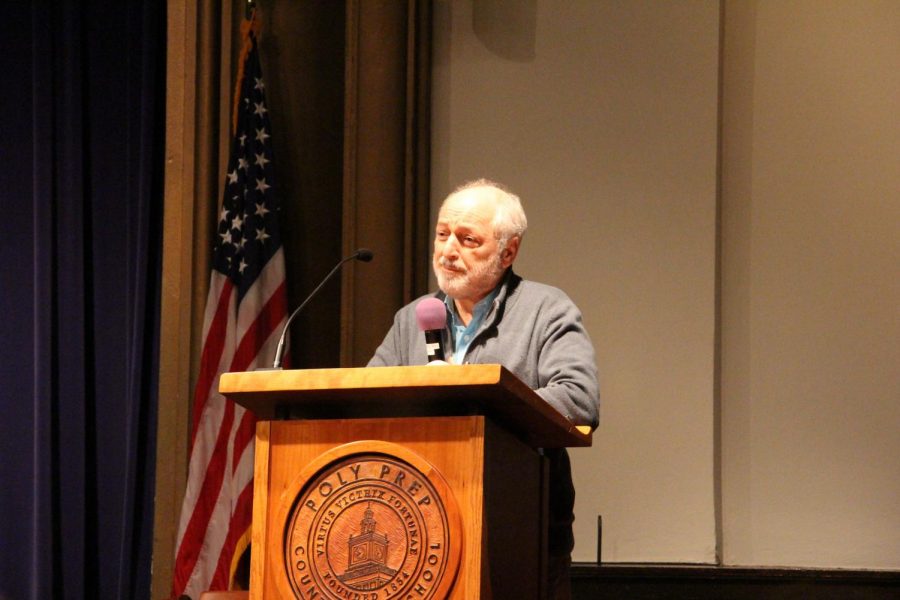A Personal Reflection on New Movie, “Call Me By Your Name”
André Aciman spoke to the Poly community on Friday, December 15.
December 19, 2017
In a stunning and unique voice, author André Aciman tells the beautiful story of first love in his novel Call Me By Your Name. At first read, this is a sensual and deeply romantic love story told over one summer, but upon further investigation, it is apparent that what Aciman has built is actually a tale of romantic and sexual awakening. This story is about coming of age, the inevitable loss of your first love and deep-seated, life-changing desire.
Elio Perlman, the protagonist, recalls the summer of 1987 at his family’s home in northern Italy. He provides a strong narrative structure of what would, could and should have been, telling a conditional truth, which Aciman describes as ‘another dimension’. Coming from a multilingual family, his mother speaking four languages and his father three, Elio is well versed in language, music and history, a modern Renaissance man. Each year, his father takes in a graduate student to help him with his archeological work while they build on their doctorates. This particular year, the intruder is a young man called Oliver who stuns Elio with his movie star looks and casual American mannerisms.
Aciman writes a love letter to Italy through his description. In his description of the summer villa, it becomes its own world, contained within the boundaries of the river and tennis courts. As Elio muses, there is also the feeling that the boundary of this world is summer itself: long days with lunches and dinners that last hours are his medium. Along with the physical setting of ‘somewhere in northern Italy,’ this narrative also takes place within the psyche of a young man in the throes of passionate love. Aciman dives deeply into the soul of Elio, creating a genuine and complex character voice and personality.
From the beginning shots of ancient Greek sculptures scattered over a desk with gentle piano music in the background, Guadagnino seems concerned with keeping the perfect Italian summer love story that Aciman so masterfully crafts. The feeling of nostalgia is kept strong through the film. Whether it’s through Armie Hammer, playing Oliver dancing to the classic new-wave 80s song ‘Love My Way’ by the Psychedelic Furs, or Timothée Chalamet, playing Elio sporting much too short and offensively patterned swim trunks, stepping into the theater transports you to 1987 just as the book did. The movie is performed in the key of a slow and lazy Italian summer. Long days are punctuated with longer dinners, friends coming from their own villas to eat ripe tomatoes and drink wine in the garden with the Perlmans.
Love, passion and loss are portrayed by the score, which features original songs from acclaimed composer Sufjan Stevens. Aciman concedes that the actors made the movie. Timothée Chalamet uses his unique personality and phenomenal acting skills to bring the character to life. The chemistry between him and his co-star Armie Hammer is palpable as they portray each scene with unbridled and unforgiving attraction.
As Aciman stood at the podium in Chapel, observing the group of seniors and students gathered in the pews, he carried a distinct air of intellect and eloquence. He started with a passage from his personal essay Alibis, describing his childhood and the feeling of grappling with one’s identity.
“I was born in Alexandria, Egypt, but I am not Egyptian. I was born into a Turkish family but I am not Turkish. I was sent to British schools in Egypt but I am not British,” Aciman said.
Aciman shared many pieces of wisdom through his lecture, both about his own writing, writing in general or the books that we should be reading (“Hemingway? Junk.”), but his points always returned to the idea of not belonging anywhere, of searching for the identity that you are happy with and how futile that struggle is.
Aciman is a lost soul searching for identity in people and in places. Even more literally, he is a multilingual and cultured young boy, sequestering himself in his room to finish a book before dinner.















































ana • Dec 20, 2017 at 3:35 pm
beautiful piece